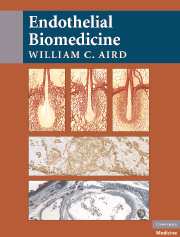Book contents
- Frontmatter
- Contents
- Editor, Associate Editors, Artistic Consultant, and Contributors
- Preface
- PART I CONTEXT
- PART II ENDOTHELIAL CELL AS INPUT-OUTPUT DEVICE
- PART III VASCULAR BED/ORGAN STRUCTURE AND FUNCTION IN HEALTH AND DISEASE
- PART IV DIAGNOSIS AND TREATMENT
- PART V CHALLENGES AND OPPORTUNITIES
- 187 Introductory Essay: Complexity and the Endothelium
- 188 Agent-Based Modeling and Applications to Endothelial Biomedicine
- 189 Scale-Free Networks in Cell Biology
- 190 Cell Fates as Attractors: Stability and Flexibility of Cellular Phenotypes
- 191 Equation-Based Models of Dynamic Biological Systems
- 192 Vascular Control through Tensegrity-Based Integration of Mechanics and Chemistry
- 193 Simulating the Impact of Angiogenesis on Multiscale Tumor Growth Dynamics Using an Agent-Based Model
- 194 New Educational Tools for Understanding Complexity in Medical Science
- 195 Endothelial Biomedicine: The Public Health Challenges and Opportunities
- 196 Conclusion
- Index
- Plate section
195 - Endothelial Biomedicine: The Public Health Challenges and Opportunities
from PART V - CHALLENGES AND OPPORTUNITIES
Published online by Cambridge University Press: 04 May 2010
- Frontmatter
- Contents
- Editor, Associate Editors, Artistic Consultant, and Contributors
- Preface
- PART I CONTEXT
- PART II ENDOTHELIAL CELL AS INPUT-OUTPUT DEVICE
- PART III VASCULAR BED/ORGAN STRUCTURE AND FUNCTION IN HEALTH AND DISEASE
- PART IV DIAGNOSIS AND TREATMENT
- PART V CHALLENGES AND OPPORTUNITIES
- 187 Introductory Essay: Complexity and the Endothelium
- 188 Agent-Based Modeling and Applications to Endothelial Biomedicine
- 189 Scale-Free Networks in Cell Biology
- 190 Cell Fates as Attractors: Stability and Flexibility of Cellular Phenotypes
- 191 Equation-Based Models of Dynamic Biological Systems
- 192 Vascular Control through Tensegrity-Based Integration of Mechanics and Chemistry
- 193 Simulating the Impact of Angiogenesis on Multiscale Tumor Growth Dynamics Using an Agent-Based Model
- 194 New Educational Tools for Understanding Complexity in Medical Science
- 195 Endothelial Biomedicine: The Public Health Challenges and Opportunities
- 196 Conclusion
- Index
- Plate section
Summary
Recent advances in endothelial biomedicine and vascular biology have provided renewed hope that strategies for health promotion and the prevention and control of diseases can be improved substantially. These advances hold promise for the detection, evaluation, prevention, treatment, and control of chronic diseases in general and cardiovascular diseases (CVDs) in particular. However, translating these scientific advances into effective clinical practices poses unique challenges (1–3), and translating them into effective public health practices at the community or population level is even more daunting.
This final translational step is crucial, especially for scientific advances related to chronic noncommunicable diseases and their risk factors, which constitute some of the major public health challenges of the twenty-first century. The World Health Organization has estimated that 35 million people died from chronic diseases in 2005 alone and that heart diseases, stroke, cancer, chronic respiratory diseases, and diabetes accounted for the bulk of these deaths (4). These chronic diseases and their risk factors are major epidemics that are not likely to be conquered at the bedside by using individual patient strategies. However, a combination of individual and population-based strategies built on a sound foundation of biomedical science holds tremendous promise for success.
This chapter presents a review of the major advances in vascular biology likely to provide the bases for successful public health policy, practice, and research initiatives in chronic disease prevention and control. It describes clinicians' frequent failure to recognize the endothelium as a spatially distributed organ system, addresses the relevance for continuing medical education and translational research, and discusses the practical implications for health promotion and the prevention and control of chronic diseases.
- Type
- Chapter
- Information
- Endothelial Biomedicine , pp. 1807 - 1814Publisher: Cambridge University PressPrint publication year: 2007



